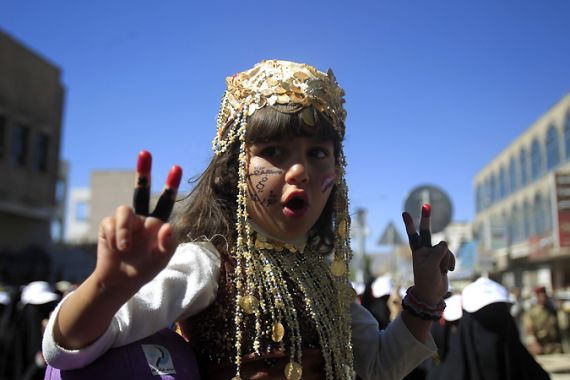More deaths in Yemen violence
At least two killed in shelling in the city of Taiz following protests, taking the death toll in violence there to 17.

 |
| Protesters in Sanaa denounced violence in the southern Yemeni city of Taiz on Saturday [REUTERS] |
At least two Yemenis were killed in a third day of shelling by government forces of the country’s second city of Taiz, as sustained violence threatened to derail a fragile power-transfer deal.
State media said a ceasefire was reached in the afternoon after a call by Abdrabuh Mansur Hadi, the vice-president, for an end to the fighting that has killed a total of 17 people, and a pullout of troops and casual fighters.
And the opposition warned it will not go ahead with forming a national unity government until a military commission is formed in line with a Gulf-brokered accord and the offensive on Taiz halted.
Governor Hammoud al-Sufi agreed with representatives of the Common Forum on a truce starting at 2pm (local time) in addition to withdrawing military units and gunmen according to mechanism to be agreed, Saba news agency said.
Residents said intermittent fighting could still be heard later on Saturday.
“A seven-storey building has been set on fire,” Abdel-Jabbar Mahmnoud told the Reuters news agency by telephone from the al-Hasab district in
Taiz.
He said residents had fled shelling by government forces based at a security compound in the city.
Tens of thousands earlier defied the shelling to march in the city centre demanding that Saleh be put on trial.
Residents said government forces used artillery, tanks and rockets on Saturday in residential areas of Taiz, trapping about 3,000 families in the commercial hub some 200km south of the capital Sanaa. Opposition fighters responded with medium and light fire, they said.
Medics said two people were killed, one of them an activist shot by a sniper during the demonstration. The second was a bakery worker killed in front of his shop. Four people were also wounded, including one woman.
Gunmen backing anti-Saleh protesters control the centre of Taiz and most of its streets, while government forces have taken up position on hills within the city and on its outskirts.
Neighbourhoods pounded
Witnesses said forces loyal to Saleh pounded most neighbourhoods in Taiz on Saturday, while clashes raged in western parts of the city, including Al-Hasab, Beir Basha, Wadi al-Qadi and Al-Murur.
The bloodshed sparked recriminations between the government and parliamentary opposition, which signed the hard-won accord in Riyadh that had raised hopes of an end to 10 months of violence.
Prime minister-designate Mohammed Basindawa, chosen by the opposition to head a government of national unity under the power transfer agreement, has threatened to resign unless the loyalist offensive against Taiz stops.
And Mohammed Qahtan, opposition spokesperson, accused Saleh loyalists of blocking the formation of a key commission tasked with restructuring the security forces, many branches of which are under the command of Saleh’s relatives.
Hadi late on Friday ordered the governor of Taiz to begin talks with the Common Forum opposition aimed at reaching a ceasefire and the withdrawal of troops and other fighters from the city.
Hadi now holds the constitutional powers of Saleh who last month in Riyadh signed the Gulf-brokered deal under which his powers were passed on to his deputy, although he remains honorary president for three months.
Qahtan told the AFP news agency on Saturday that Hadi’s directives were not enough, calling again for the formation of the military commission as stipulated in the Riyadh agreement.
The opposition will not present its nominees for a national unity government until the commission is formed, he said.
Supplies blocked
Meanwhile, local residents took action to try to stem the flow of military supplies to pro-Saleh troops from regions surrounding Tiez, which lies 270km southwest of Sanaa.
In Al-Raheeda, 30km south of Taez, locals, including women and children, staged a sit-in on the main road obstructing a military convoy heading to Taez from the Anad base in Lahij, witnesses said.
Fresh protests also broke out in the capital Sanaa for Saleh to be put on trial, despite a Gulf-tailored peace deal which granted him immunity from prosecution.